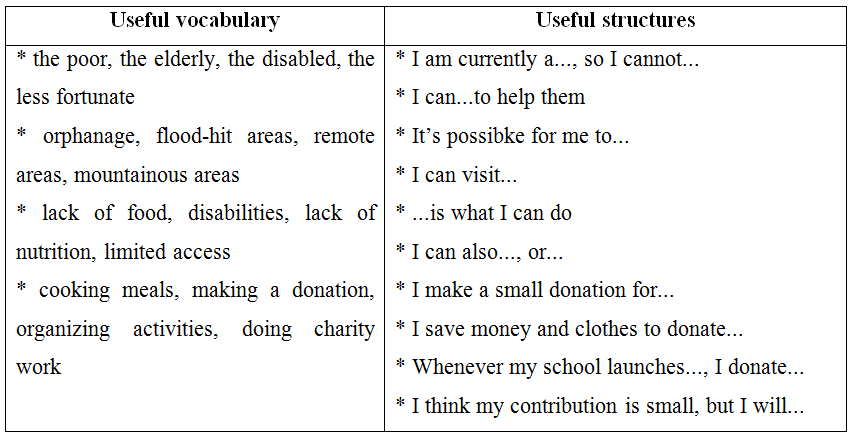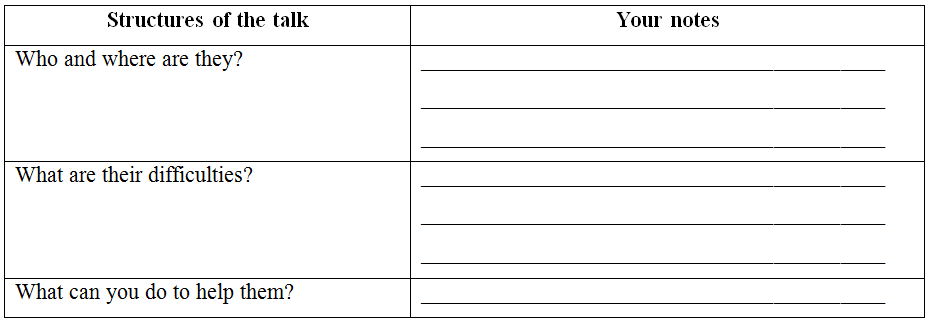Listen to the story of a volunteer and decide whether the statements below are TRUE (T) or FALSE (F).
1. The speaker is from Colombia, and volunteered to teach English in Germany.
 Giải bởi Vietjack
Giải bởi Vietjack
Audio script:
I am German, and I went abroad to do voluntary work.
Last year, I volunteered to teach English in Colombia. I wasn’t quite sure about how I would be as a teacher. I really wanted to try it, and I guessed I could help from a unique perspective because English is my second language. Of course, when you don’t speak Spanish, there is a barrier between you and the people you’re teaching. What really surprised me, though, is how easy it is to overcome that. You actually have more in common with the kids than you think.
During my 2 weeks in Colombia, I taught boys between 8-14 years old, and they were amazing. I still remember their smiling faces, full of love and eager to learn. The highlight was a drawing activity I organized for my final volunteer day. I was so happy with how well it went and I felt so lucky to be gifted one of the drawings. I will treasure it forever.
I’ll never forget what it was like saying goodbye. I naively thought before I went that I was giving something to them, but actually, I was the one who received so much.1. The speaker is from Colombia, and volunteered to teach English in Germany.
Tôi là người Đức và tôi đã đi ra nước ngoài để hoạt động tình nguyện.
Năm ngoái, tôi đã từng tình nguyện làm giáo viên tiếng Anh ở Colombia. Tôi khá không chắc chắn về việc tôi sẽ trở thành một giáo viên như thế nào. Tôi thực sự muốn thử nó, và tôi đoán rằng tôi có thể giúp đỡ theo một khía cạnh độc đáo, bởi vì tiếng Anh là ngôn ngữ thứ hai của tôi. Tất nhiên, khi bạn không nói tiếng Tây Ban Nha, sẽ có một rào cản giữa bạn và những người bạn dạy. Tuy nhiên, điều thực sự khiến tôi ngạc nhiên là vượt qua điều đó mới dễ dàng làm sao. Bạn thực sự có nhiều điểm chung với những đứa trẻ hơn những gì bạn nghĩ.
Trong suốt 2 tuần tôi ở Colombia, tôi đã dạy những cậu bé từ 8-14 tuổi và chúng thật tuyệt vời. Tôi vẫn nhớ khuôn mặt tươi cười, tràn đầy tình yêu và ham học hỏi của chúng. Điểm nổi bật là hoạt động vẽ tranh mà tôi tổ chức trong ngày tình nguyện cuối cùng của tôi. Tôi đã rất hạnh phúc vì nó đã diễn ra tốt đẹp và tôi cảm thấy mình thật may mắn khi được tặng một trong những bức vẽ. Tôi sẽ trân trọng nó mãi mãi.
Tôi không bao giờ quên những cảm giác khi nói lời tạm biệt. Trước khi đi, tôi ngây thơ nghĩ rằng tôi mới là người cho đi, nhưng thực ra tôi là người được nhận lại rất nhiều.Đáp án: False
Dịch nghĩa câu hỏi: Người nói đến từ Colombia và tình nguyện dạy tiếng Anh ở Đức.
Giải thích: Thông tin ở câu đầu tiên của bài: “I am German, and I went abroad to do voluntary work.”
Gói VIP thi online tại VietJack (chỉ 400k/1 năm học), luyện tập gần 1 triệu câu hỏi có đáp án chi tiết
4. It is_________to use words like ‘dumb’, ‘blind’ and ‘deaf’ to the disabled. (RESPECT)
Talk about what you think you can do to help people in need.
You can use the following questions as cues:
* Who and where are they?
* What are their difficulties?
* What can you do to help them?
Useful languages:

Complete the notes:

Now you try!
Give your answer using the following cues. You should speak for 1-2 minutes.
1. I am currently a..., so I cannot...
2. I can...to help them
3. I can visit...
4. I can also..., or...
5. I make a small donation for...
6. Whenever my school launches..., I donate...
7. I think my contribution is small, but I will...
Now you tick!
Did you ...
- answer all the questions in the task?
- give some details to each main point?
- speak slowly and fluently with only some hesitation?
- use vocabulary wide enough to talk about the topic?
- use various sentence structures (simple, compound, complex) accurately?
- pronounce correctly (vowels, consonants, stress, intonation)?
Let’s compare!
Finally, compare with the sample answer on page 190.
3. He_________blind. He became visually impaired after an accident.
4. He began to teach English for disabled children in 2002. (since)
→____________________________________________
1. She has used a wheelchair since her bones (fracture)__________in the car accident last year.
Write an essay (150-180 words) about problems that people living in remote and mountainous areas in your country may face.
* You can use the following questions as cues:
* Who are they?
* What are their problems?
* Why do they have those problems?
__________________________________________________________________
__________________________________________________________________
__________________________________________________________________
__________________________________________________________________
__________________________________________________________________
__________________________________________________________________
__________________________________________________________________
__________________________________________________________________3. This campaign has been launched since 1999. (for 20 years)
→____________________________________________
1. The charity raises a fund of thousands of dollars for the underprivileged so far.
8. He has been a volunteer for Youth Blood Donor Organisation_________.
1. People in my neighborhood have_________more than $400 to the charity.
1. The last time I saw her was 5 years ago. (for)
→____________________________________________
1. This non-profit organisation_________milk for hundreds of children in this remote area.